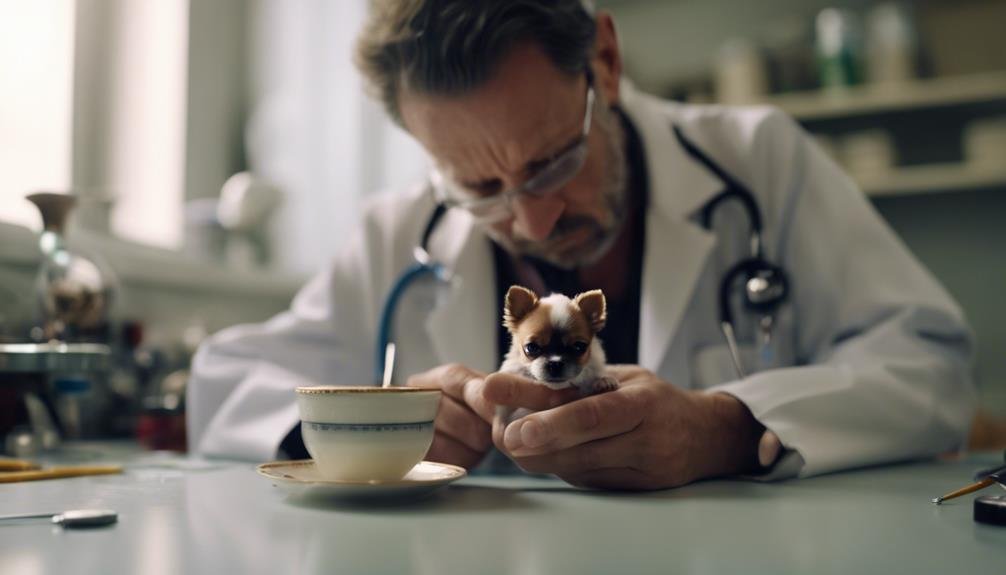
Teacup dogs have undeniably become a popular choice for many prospective pet owners, allured by their miniature size and endearing appeal. However, beneath their charming facade lies a complex world of breeding practices that raise significant health concerns.
A veterinarian’s perspective sheds light on the realities of owning these tiny canines, addressing crucial aspects of their well-being that often go unnoticed. Understanding the implications of teacup dog ownership goes beyond their adorable aesthetics, prompting a deeper reflection on the responsibilities and ethical considerations that come with welcoming these diminutive companions into our lives.
Key Takeaways
- Teacup dogs are miniature breeds with health risks due to breeding practices.
- Consider adopting from responsible breeders or rescues to prioritize canine well-being.
- Breeding for extreme small sizes can lead to severe health issues in teacup dogs.
- Educate yourself on the risks and responsibilities before choosing a teacup dog as a pet.
Teacup Dogs: Miniature Breeds and Concerns
Teacup dogs, often marketed as miniature versions of toy breeds, raise significant concerns due to their diminutive size and the associated health risks stemming from breeding practices. While these tiny pups may seem adorable, their size is often a result of unethical breeding methods that prioritize size over well-being.
Breeding for extreme smallness can lead to a myriad of health issues, including fragile bones, dental problems, and organ complications. The pressure to achieve a certain size can result in genetic abnormalities and a predisposition to various illnesses.
It is crucial for prospective owners to understand the risks involved in caring for teacup dogs and to prioritize the well-being of these delicate creatures above aesthetic preferences.
Health Risks in Teacup Dogs
Health hazards associated with miniature dog breeding practices encompass a range of genetic and wellness challenges. Teacup dogs, bred for their tiny size, often suffer from various health risks due to their miniature stature. These risks include a higher likelihood of liver disease, heart disease, seizures, dental issues, and tooth decay.
Inbreeding and indiscriminate breeding practices can exacerbate genetic health issues and concentrate disease risks within these small breeds. The extreme reduction in size through breeding can result in health problems, such as a collapsed trachea, hypoglycemia, incontinence, anxiety, and bone fractures.
Understanding these health risks is crucial for potential teacup dog owners to make informed decisions regarding the care and well-being of these petite companions.
Genetic Challenges and Wellness Issues

Genetic challenges and wellness issues in miniature dog breeding practices highlight the significance of responsible breeding strategies and comprehensive healthcare for these small canine companions. Teacup dogs, due to their small size and selective breeding, are prone to various health risks and genetic disorders. Inbreeding practices can exacerbate these issues, leading to breed-specific heritable diseases.
Common health conditions in teacup breeds include collapsed trachea, hypoglycemia, incontinence, anxiety, and bone fractures. To ensure the well-being of teacup dogs, it is crucial for breeders to prioritize genetic testing, provide compassionate care, and address any compounded health issues promptly. By understanding and addressing these genetic challenges and wellness issues, we can work towards improving the overall health and quality of life for teacup dogs.
Breeding Practices and Health Implications
In the realm of small dog breeding practices, the focus lies on the methods employed and the resulting impact on the well-being of the canines. Breeding teacup dogs often involves indiscriminate practices that prioritize size over health, leading to serious health implications.
Breeders may resort to line-breeding or inbreeding to achieve miniature sizes, increasing the risk of genetic health issues and concentrating disease vulnerabilities within the breed. Extreme size reduction through selective breeding can result in various health problems, including liver disease, heart issues, seizures, dental complications, and tooth decay.
Furthermore, crossbreeding for desired physical traits may overlook potential health complications, emphasizing the importance of responsible breeding practices to safeguard the well-being of teacup dogs.
Considerations Before Choosing a Teacup

When considering bringing a teacup dog into your home, it is imperative to thoroughly evaluate the breeder’s practices and prioritize the well-being of the potential canine companion.
Ensure the breeder follows responsible breeding practices, prioritizing the health and welfare of the dogs over achieving miniature sizes for profit. Look for breeders who conduct health screenings, provide proper veterinary care, and prioritize the overall well-being of their dogs.
Responsible breeders will offer transparency about the breeding process, genetic testing, and potential health risks associated with teacup dogs. By choosing a reputable breeder who prioritizes ethical practices and the health of the dogs, you can help ensure a happier and healthier life for your teacup companion.
Rescue and Responsible Breeding Advocacy
Advocating for the rescue and promotion of responsible breeding practices in the teacup dog industry is paramount for ensuring the welfare and well-being of these small canine companions.
By supporting rescue efforts, individuals can provide a second chance to poorly bred teacup dogs and help combat irresponsible breeding practices. Responsible breeders play a crucial role in prioritizing the health and quality of life of teacup dogs by adhering to breeding standards and conducting proper health screenings.
Reporting unethical breeders and supporting reputable ones can contribute to the overall improvement of breeding practices in the teacup dog community, ultimately benefiting the dogs and their future owners. It is essential to raise awareness about the importance of responsible breeding and rescue initiatives to safeguard the well-being of teacup dogs.
Guidelines for Finding Reputable Breeders

Exploring reputable sources for teacup dog breeders can aid in ensuring the health and ethical standards of potential canine companions. When searching for a reputable breeder, consider contacting local breed clubs or associations associated with the specific teacup breed of interest.
Reputable breeders prioritize the health and well-being of their dogs, conducting necessary health screenings, providing proper care, and adhering to breed standards. Additionally, visiting the breeder’s facility in person can offer insights into their breeding practices and the living conditions of the dogs.
Requesting references from previous puppy buyers can also provide valuable feedback on the breeder’s reputation and the health of their dogs. By following these guidelines, prospective teacup dog owners can make informed decisions and support responsible breeding practices.
Teacup Dog Size Reduction Risks
Investigating the implications of size reduction in teacup dogs reveals significant risks associated with breeding practices that prioritize miniature sizes over the health and well-being of the animals. When considering teacup dog size reduction, it’s crucial to understand the potential dangers involved:
- Increased Susceptibility to Health Issues: Smaller size often correlates with fragility and a higher likelihood of various health problems.
- Developmental Abnormalities: Breeding for extreme miniaturization can result in developmental abnormalities and skeletal issues.
- Reduced Lifespan: Teacup dogs bred for size may have a shorter lifespan due to genetic predispositions and health complications.
- Quality of Life Concerns: Diminished size can impact the overall quality of life, leading to a range of physical and emotional challenges for the dog.
Consequences of Indiscriminate Breeding

The ramifications of indiscriminate breeding practices in teacup dogs are profound, impacting both the health and welfare of these miniature breeds. Indiscriminate breeding can result in a myriad of health issues for teacup dogs, including genetic disorders, congenital defects, and compromised immune systems.
By prioritizing size over health, irresponsible breeders perpetuate a cycle of suffering for these tiny canines. Inbreeding and line-breeding practices further exacerbate the genetic health risks in teacup dogs, leading to a higher prevalence of serious medical conditions.
It is imperative to raise awareness about the detrimental consequences of indiscriminate breeding in teacup dogs to encourage responsible breeding practices that prioritize the well-being of these vulnerable animals.
Importance of Compassionate Care
Compassionate care plays a pivotal role in safeguarding the well-being of teacup dogs and addressing their unique health challenges. When caring for teacup dogs, it is essential to consider their delicate nature and potential health risks.
Here are key aspects of compassionate care for teacup dogs:
- Regular Veterinary Check-ups: Teacup dogs require frequent visits to the veterinarian to monitor their health status and address any issues promptly.
- Balanced Nutrition: Providing a well-balanced diet tailored to the specific needs of teacup breeds is crucial for their overall health and well-being.
- Gentle Handling: Due to their small size, teacup dogs are fragile and require gentle handling to prevent injuries.
- Emotional Support: Teacup dogs may experience anxiety and stress, so providing a loving and nurturing environment is essential for their mental health.
Responsible Breeding Practices

When considering responsible breeding practices for teacup dogs, prioritizing the health and well-being of the breeding dogs and their offspring is paramount. Responsible breeders focus on maintaining the overall health and genetic diversity of the breed, rather than solely breeding for smaller sizes. This involves conducting genetic testing to screen for heritable diseases, avoiding inbreeding practices, and ensuring proper veterinary care for the breeding dogs.
Additionally, responsible breeders provide a nurturing environment for the puppies, prioritize socialization, and offer support to new owners. By following ethical breeding practices, such as transparent health testing, responsible breeders contribute to the long-term well-being of teacup dogs and help prevent the propagation of genetic health issues within the breed.
Educating Potential Teacup Dog Owners
In light of the importance of responsible breeding practices for teacup dogs, educating potential owners about the risks and considerations associated with these small breeds is crucial for ensuring their well-being and proper care. Here are four key points to consider when thinking about getting a teacup dog:
- Research Responsible Breeders: Look for breeders who prioritize the health and well-being of their dogs over achieving smaller sizes.
- Understand Health Risks: Be aware of the potential genetic challenges and health issues that teacup dogs may face due to their breeding practices.
- Consider Adoption: Rescue poorly bred teacup dogs or consider adopting from shelters to provide a loving home to dogs in need.
- Consult with Veterinarians: Seek advice from veterinary professionals to understand the specific care requirements and potential health risks associated with teacup breeds.
Are Teacup Dogs Suitable for Adoption, and What Should Potential Owners Know About Them?
Teacup dogs can be suitable for adoption, but potential owners must be aware of their special needs. These small dogs require extra care and attention, and it’s important to consider if they are the right fit for your lifestyle. Research reputable sources online to find where to adopt a dog that fits your needs.
Conclusion
In conclusion, the world of teacup dog breeding poses significant challenges and ethical concerns due to genetic manipulation and irresponsible practices.
Prospective owners must carefully consider the health risks, breeding standards, and overall well-being of these delicate creatures before welcoming them into their homes.
It is crucial to promote responsible pet ownership, educate potential owners, and advocate for compassionate care to ensure the welfare of teacup dogs in the face of increasing demand and breeding practices. When searching for a reputable breeder, consider contacting local breed clubs or associations associated with the specific teacup breed of interest. owever, beneath their charming facade lies a complex world of breeding practices that raise significant health concerns.




